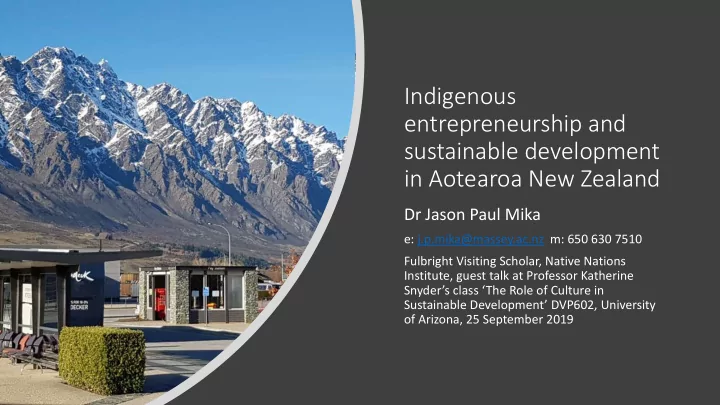

Indigenous entrepreneurship and sustainable development in Aotearoa New Zealand Dr Jason Paul Mika e: j.p.mika@massey.ac.nz m: 650 630 7510 Fulbright Visiting Scholar, Native Nations Institute, guest talk at Professor Katherine Snyder’s class ‘The Role of Culture in Sustainable Development’ DVP602, University of Arizona, 25 September 2019
Thinking about where you were born and raised (your “home town”), tell us: • The name of your most significant mountain • The name of your most important river, lake or coastal waters Introductions • The name of an important ancestor in your family • The name of the village or town where these places and people (and you) come from Identify one major (iconic) contribution to ‘culture’ that your “home town” is known for or you remember most.
Tūhoe is my tribe Maungapōhatu is my mountain Ōhinemataroa is my river Waikirkiri is my marae Mika Te Tawhao is my ancestor 20-Aug-20 3
Inspiration for my research • The wisdom of my elders • Māori entrepreneurs • Māori small businesses • Indigenous entrepreneurs • A passion for research, policy and practice 20-Aug-20 4
• Indigenous world view • Indigenous entrepreneurship • Sustainable development • Role of government • Case studies Agenda • Māori marine economy • Māori agribusiness • Māori tourism • Implications for research, policy and practice • Question and answer
Māori economy Māori entrepreneur Māori enterprise Māori development Identity, indigenous Identity, definition and Identity, nature, Identity, self- entrepreneurial enterprise development measurement, determination, wellbeing, capabilities development and potential, freedom growth Māori economic development
Identity
Indigenous world view • Metaphysical explanations of the world and our place within it • Interconnectedness of all things creates sense of responsibility • Key concepts: • Whakapapa (genealogy) • Wairuatanga (spirituality) • Tapū, noa (sacred and profane) • Mauri (life force) • Indigenous culture, language and institutions accord with this paradigm
Te Kupenga: Survey of Māori wellbeing • Culture: 373,000 (70 percent) Māori adults said Māori culture somewhat important. • Marae: 71% of Māori know their marae. • Iwi: 89 percent of Māori adults said they knew their iwi. • Reo: 257,500 (55 percent) Māori adults had some ability to speak, 50,000 (11 percent) speak well • Most Māori defined their whānau by whakapapa.
Mult ulti- dimensional Model of Māori Identity and Cultural Engagement
How do tribes create culturally grounded global citizens? How do tribes rebalance wealth creation Unfolding (shared capital) and wealth distribution (shared well-being)? tensions among post- How do tribes recalibrate tribal settled iwi institutions so they are fit for purpose? How can tribes embed entrepreneurship, innovation and enterprise within the tribe?
Entrepreneur
Entrepreneurship • Non-indigenous entrepreneurs • Creating new combinations • Bearers of risk and uncertainty • Seize price differentials • Individualised value and impact • Non-indigenous entrepreneurship • Perceiving opportunity • Emphasis on newness & growth • Venture formation and growth
A Māori entrepreneur is a person who identifies as Māori and engages in entrepreneurial activity according to a Māori world view, but integrates within this, elements of a Western world view. Māori entrepreneurship 20-Aug-20 14
• Culture, identity and socialisation as Māori • Self-determination, potentiality and freedom • Māori enterprise ownership and values • Duality, collectivism, permanence and intergenerationality • Integrate Māori and Western world views A Māori way of doing business 20-Aug-20 15
Indigenous entrepreneurship • “A means of fulfilling aspirations for • Theoretical and practical challenges: self-determination, sustainable • Developing indigenous theories of economic development, preservation value and economy of traditional knowledge, improving • Balancing cultural and socioeconomic and structural commercial imperatives disadvantage and validating • Indigenous entrepreneurship as alternative conceptualisations of self-development. economy. ” Mika, Smith, Gillies and Wiremu,(2019, p. 3).
Enterprise
What is a Māori enterprise? What participants say... Māori values Ownership by Māori Self-identification Self-determination Profit distribution Māori in business (Mika, 2015)
Recommend
More recommend